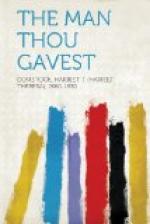Over and over again he read the words and pondered upon his own change of mind. Youth, no matter how lean and beggared it may be, craves and insists upon conflict—upon the personal loss and gain. But as time takes one into its secrets, the soul gets the wider—Truedale now was sure it was the wider—outlook. Having fought—because the fight was part of the written story—the craving for victory, of the lesser sort, dwindled, while the higher call made its appeal. To be part of the universal; to look back upon the steps that led up, or even down, and hold the firm belief that here, or elsewhere—what mattered in the mighty chain of many links—the “interpretation” told!
Truedale came to the conclusion that fatalism was no weak and spineless philosophy, but one for the making of strong souls.
Failure, even wrong, might they not, if unfettered by the narrow limitations of here and now, prove miracle-working elements?
Then the effect upon others entered into Truedale’s musings as it had in the beginning. The “stories” of others! He leaned his head at this juncture upon his clasped hands and thought of Nella-Rose! Thought of her as he always did—tenderly, gently, but as holding no actual part in his real life. She was like something that had gained power over an errant and unbridled phase of his past existence. He could not make her real in the sense of the reality of the men, women, and affairs that now sternly moulded and commanded him. She was—she always would be to him—a memory of something lovely, dear, but elusive. He could no longer place and fix her. She belonged to that strange period of his life when, in the process of finding himself, he had blindly plunged forward without stopping to count the cost or waiting for clear-sightedness.
“What has she become?” he thought, sitting apart with his secret work. And then most fervently he hoped that what Lynda had once suggested might indeed be true. He prayed, as such men do pray, that the experience which had enabled him to understand himself and life better might also have given Nella-Rose a wider, freer space in which to play her chosen part.
He recalled his knowledge of the hill-women as Jim White had described them—women to whom love, in its brightest aspect, is denied. Surely Nella-Rose had caught a glimpse more radiant than they. Had it pointed her to the heaven of good women—or—?
And eventually this theme held and swayed the play—this effect of a deep love upon such a nature as Nella-Rose’s, the propelling power—the redeeming and strengthening influence. In the end Truedale called his work “The Interpretation.”
And while this was going on behind the attic door, a seemingly slight incident had the effect of reinforcing Truedale’s growing belief in his philosophy.
He and Lynda went one day to the studio of a sculptor who had suddenly come into fame because of a wonderful figure, half human, half divine, that had startled the sophisticated critics out of their usual calm.




